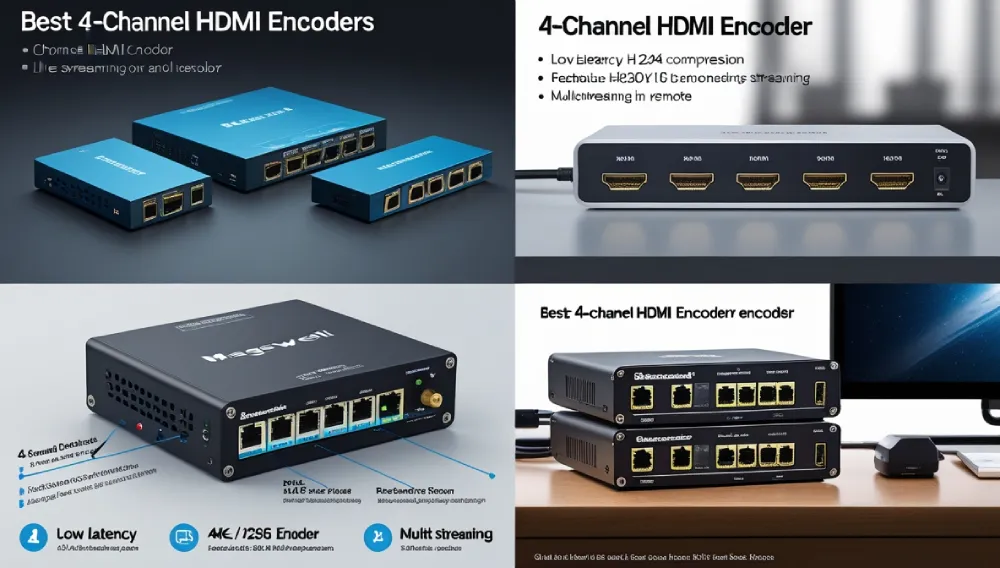Are you looking for a reliable way to stream or record multiple HDMI sources simultaneously? A 4 channel HDMI encoder might be the perfect solution! Whether you’re a content creator, live event producer, or security professional, this guide will help you understand everything about 4-channel HDMI encoders—features, benefits, top models, and buying tips.

What Is a 4 Channel Encoder?
A 4 channel HDMI is a device that converts up to four HDMI video signals into a digital format (like H.264 or H.265) for live streaming, recording, or IP-based distribution. It’s commonly used in:
- Live event production (concerts, sports, conferences)
- Broadcasting studios
- Surveillance systems (multi-camera monitoring)
- Digital signage (displaying multiple feeds on screens)
Key Features to Look For
When choosing a 4-channel HDMI encoder, consider these essential features:
✔ Video Quality – Supports 1080p, 4K, or higher resolutions
✔ Compression Formats – H.264, H.265 for efficient bandwidth use
✔ Low Latency – Crucial for real-time streaming
✔ Multi-Streaming – RTMP, SRT, UDP, or HLS support
✔ Remote Management – Web-based control for easy adjustments
✔ Scalability – Ability to add more encoders if needed

Top
Here are some of the best 4-channel HDMI encoders available today:
1. Magewell Pro Convert HX4 HDMI
Pros:
✅ Supports 4K input
✅ Ultra-low latency
✅ Compact and fanless (quiet operation)
✅ Works with popular streaming platforms
Cons:
❌ Expensive compared to basic models
❌ No built-in storage
Best for: Professional broadcasters needing high-quality encoding.
2. Epiphan Pearl-2
Pros:
✅ All-in-one live production solution
✅ Built-in switching and recording
✅ User-friendly interface
Cons:
❌ Higher learning curve for beginners
❌ Bulky design
Best for: Live event producers who need switching and encoding in one device.
3. Teradek VidiU X
Pros:
✅ Portable and rugged
✅ Supports HEVC (H.265) for better compression
✅ Built-in Wi-Fi and Ethernet
Cons:
❌ Only one HDMI input (not 4-channel)
❌ Limited to 1080p
Best for: On-the-go streaming (Note: Not 4-channel, but a great alternative for single feeds).
4. Blackmagic Design ATEM Mini Pro
Pros:
✅ Affordable for its features
✅ Built-in live switching
✅ HDMI and USB output
Cons:
❌ Only supports 1080p (no 4K)
❌ Requires external software for advanced streaming
Best for: Budget-conscious users needing live switching and encoding.

Buying Guide
1. Determine Your Needs
- Live streaming? Look for RTMP support.
- Surveillance? Prioritize low latency and reliability.
- 4K or 1080p? Higher resolution requires more bandwidth.
2. Check Compatibility
- Ensure it works with your cameras, software (OBS, vMix, Wirecast), and streaming platforms (YouTube, Facebook, Twitch).
3. Consider Latency
- For live events, <1-second latency is ideal.
- For surveillance, even lower latency is crucial.
4. Budget vs. Quality
- Under $500: Basic encoders with limited features.
- 500−500−1500: Mid-range with better compression and reliability.
- $1500+: Professional-grade with 4K, multi-format streaming.
5. Future-Proofing
- Choose encoders with firmware updates and expandable options.
Experience
As a live streamer, I’ve tested several encoders. The Magewell Pro Convert HX4 stood out for its reliability in handling multiple 4K feeds without overheating. However, for smaller setups, the Blackmagic ATEM Mini Pro was surprisingly effective despite not being a true 4-channel encoder.
For surveillance, I used an Axis Communications encoder, which worked flawlessly with IP cameras. The key takeaway? Always match the encoder to your specific use case.

FAQs
1. Can I use a 4-channel encoder for gaming streams?
Yes, but most gamers only need a single HDMI encoder. A 4-channel unit is overkill unless you’re streaming multiple console feeds.
2. What’s the difference between H.264 and H.265?
H.265 (HEVC) offers better compression (smaller file sizes) but requires more processing power. H.264 is widely supported but less efficient.
3. Do I need a separate PC for encoding?
Some encoders work standalone, while others need a computer for streaming software. Check the specs before buying.
4. Can I record and stream simultaneously?
Yes, many encoders offer recording to an SD card/NAS while streaming live.
5. What internet speed do I need for 4-channel streaming?
At least 20-50 Mbps upload for high-quality multi-streaming.
Final Thoughts
A 4 channel HDMI encoder is a powerful tool for professionals handling multiple video feeds. Whether you’re broadcasting live events, managing security cameras, or running digital signage, choosing the right encoder ensures smooth, high-quality output.
Read More: srt encoder


1 thought on “The Best 4 Channel HDMI Encoder”